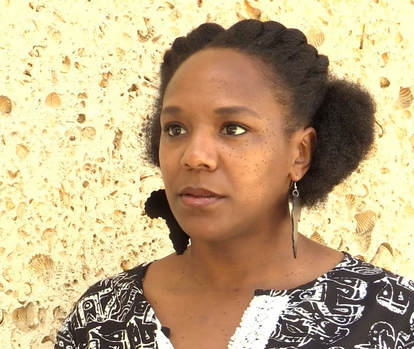|
I’ve been working on a video that I shot for the Asheville-based non-profit, Education for Engaged Citizens, about the artist and activist Bree Newsome. Newsome climbed the flagpole on the grounds of the South Carolina state capital and removed the Confederate flag shortly after a white supremacist massacred nine black church members at a prayer meeting of the Mother Emmanuel AME Church in Charleston, SC. Newsome is also one of the change makers being honored by the painter Robert Shetterly’s Americans Who Tell the Truth project which creates portraits and narratives “that highlight citizens who courageously address issues of social, environmental, and economic fairness.” Shetterly creates gorgeous oil paintings of his subjects and includes information about their contributions to society as a way to inspire others to become more engaged citizens, working for the common good.
As part of their mission to use the power of art and story to help youth to become culturally literate and engaged citizens, Education for Engaged Citizens, is bringing a travelling exhibit of American's Who Tell the Truth to Asheville's YMI Cultural Center, where Bree’s portrait will be unveiled and displayed. In addition to Shetterly’s work, the local exhibit will include posters of area activists as well as art work by local youth. Both Shetterly and Newsome will be at the opening event and reception on Sept 30th. You can find out more information and buy tickets here. It’s been interesting to work on this video over the past few weeks, after the white supremacy march in Charlottesville and the recent protests in cities across the south to remove confederate monuments from public places. All of this makes me think more deeply about the role of stories in both our public and private lives. In her interview Newsome talks about being shaped by the stories of her ancestors, some of whom were enslaved and others whose acts of strength and resistance in the face of institutional racism and segregation, are a kind of North star for her. "I see myself as being part of a struggle that has been going on for a long time," she says. She also talks about the strength she gains from knowing the history and stories of others who fought against oppression, whether as participants in the underground railroad or the civil rights movement. “Those kinds of things encourage me, the fact that we have documented historical fact that there can be a form of oppression, and people can organize and change it. And I think that’s part of what keeps me going. That’s part of why I encourage everybody to study history more. Because it’s not hopeless. It’s really not.” One definition of history might be the stories that we collectively tell ourselves about the past. As a nation we seem to be questioning the stories that comprise our shared history, examining which voices have been historically privileged, and, hopefully, listening for the diverse other stories that we most need to hear.
0 Comments
|
NEWS ARCHIVES
July 2021
|

